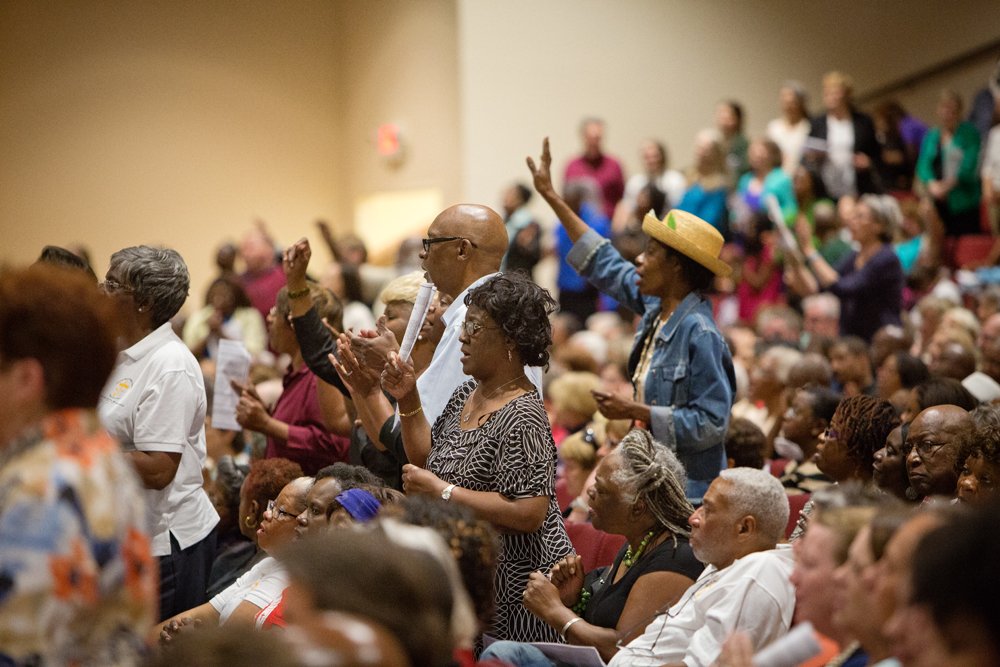April 25, 2018. Charleston City Paper.
At least eight area leaders, including five from Charleston City Council, have agreed to attend a local activist group’s gathering to discuss possible solutions to the city’s affordable housing crisis on Monday night.
A conversation on rising rent costs will be followed by a question-and-answer session with officials from the city of Charleston, the county, and neighboring municipalities at the Charleston Area Justice Ministry’s “Nehemiah Action.”
City Council members Keith Waring, James Lewis, William Dudley Gregorie, Carol Jackson, and Kevin Shealy have accepted their invitations, according to CAJM spokesperson Treva Williams. Charleston County Council member Vic Rawl, North Charleston Council member Mike A. Brown, Jr., and Mt. Pleasant Council member Guang Whitley are also expected at Monday’s night’s event.
Charleston Mayor John Tecklenburg sent CAJM a letter explaining that would not attend Monday’s gathering due to a scheduling conflict, Williams said. This will be the second year in a row that the mayor skips the Nehemiah Action.
“The mayor will be out of town with his family this evening,” said city spokesman Jack O’Toole.
O’Toole says that Mayor Tecklenburg’s advisor Josh Martin, Housing and Community Development director Geona Johnson, and Charleston Housing Authority president Don Cameron will represent the city instead.
It is not clear where the mayor will be on Monday night.
The Justice Ministry has not yet heard back from North Charleston Mayor Keith Summey. His office has not responded to a request for comment from CP.
Last year’s Nehemiah Action drew nearly 2,000 attendees.
This is the first time in two years that the social justice organization, comprised of 27 member congregations and organizations, tackles a new issue. Gatherings in 2016 and 2017 focused on racially-motivated pretext stops—where drivers are stopped for minor violations so that law enforcement officers can investigate more serious crimes. A look into police tactics in the region led to support for a racial bias audit of the Charleston Police Department.
In November, Charleston City Council voted to hire a firm specializing in racial bias to conduct a study of the police department after months of pressure from CAJM members and other activists.
“It’s been a long haul, but we are thankful and grateful for the outcome,” said North Charleston resident and CAJM member Kartika Gibson after November’s Council meeting.
By that time, members of the group had already redirected their research and rallying efforts to a new cause: Charleston’s affordable housing crisis.
Seventy percent of voters in November approved a $20 million bond referendum expected to bring approximately 800 affordable housing units to Charleston. That number is not nearly enough to alleviate the rent burden for middle class residents in the peninsula and beyond.
According to a study by the Joint Center of Housing Studies at Harvard University, more than 42 percent of renters in the Charleston-North Charleston metro area pay more than 30 percent of their yearly income in housing costs. Close to a quarter of Charleston-area renters, approximately 21,800 households, spend at least half of their income on housing.
Median gross rent in Charleston is about $1,022. In North Charleston, the biggest eviction market in the country according to court records compiled by Princeton’s Eviction Lab, median rent cost is about $893, according to U.S. Census estimates. The percentage of income spent on rent in both cities is about the same, but the average North Charleston residents makes $16,000 less per year.
CAJM’s gatherings have stirred controversy in the past, with activists pressuring evasive leaders on clear-cut answers on often emotional subjects.
“In the past, we’ve spent a significant amount of time and energy on some of the issues in convincing people there’s a problem,” said Williams. “So far, we haven’t had to do this. All officials in all jurisdictions agree we’re in a crisis. Monday night, we’re just excited for the opportunity to put some community power behind officials in calling for them to support affordable housing in a significant way.”
View original article.






